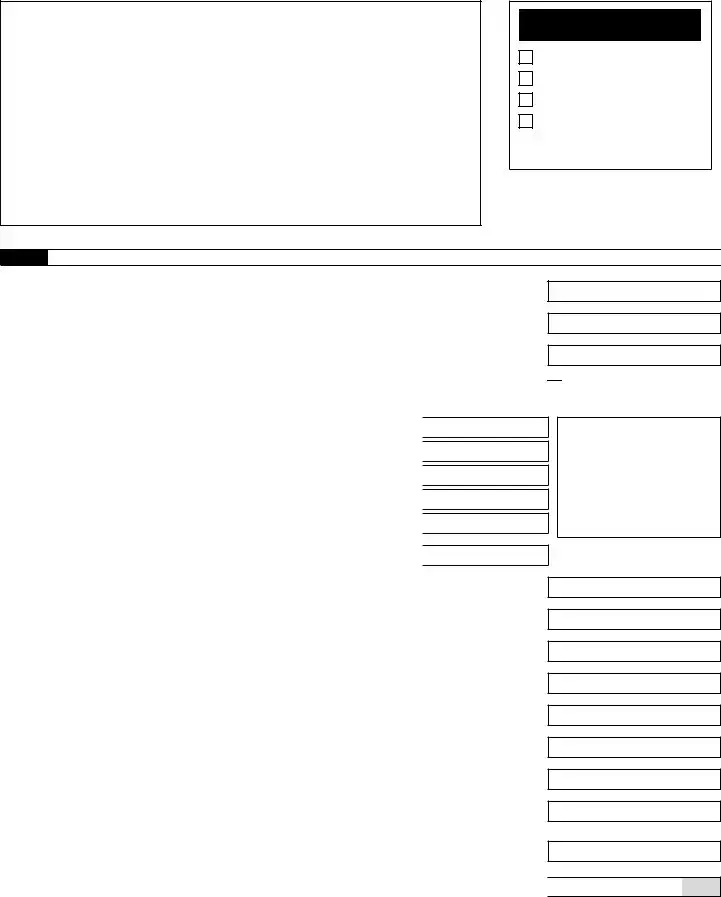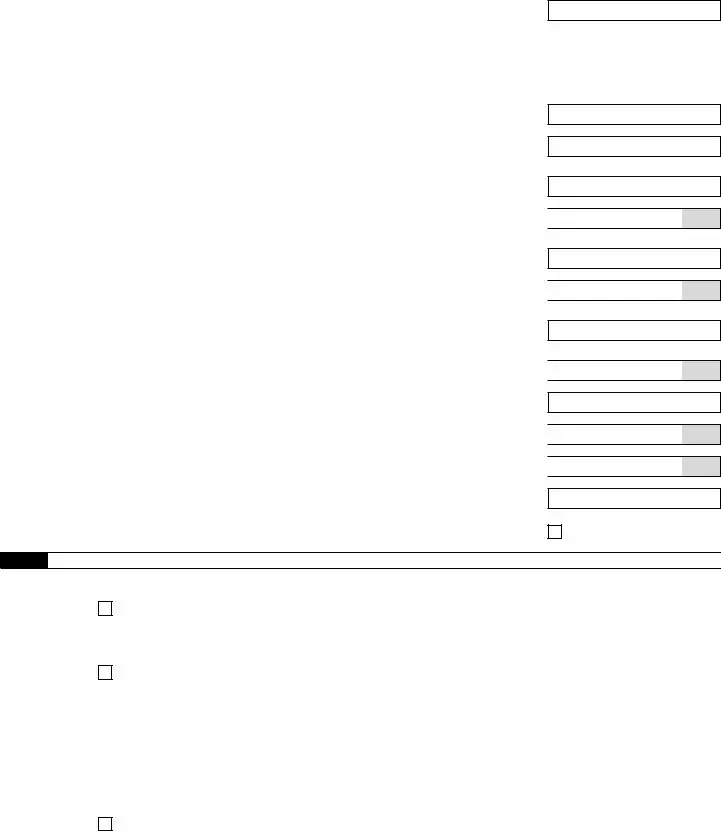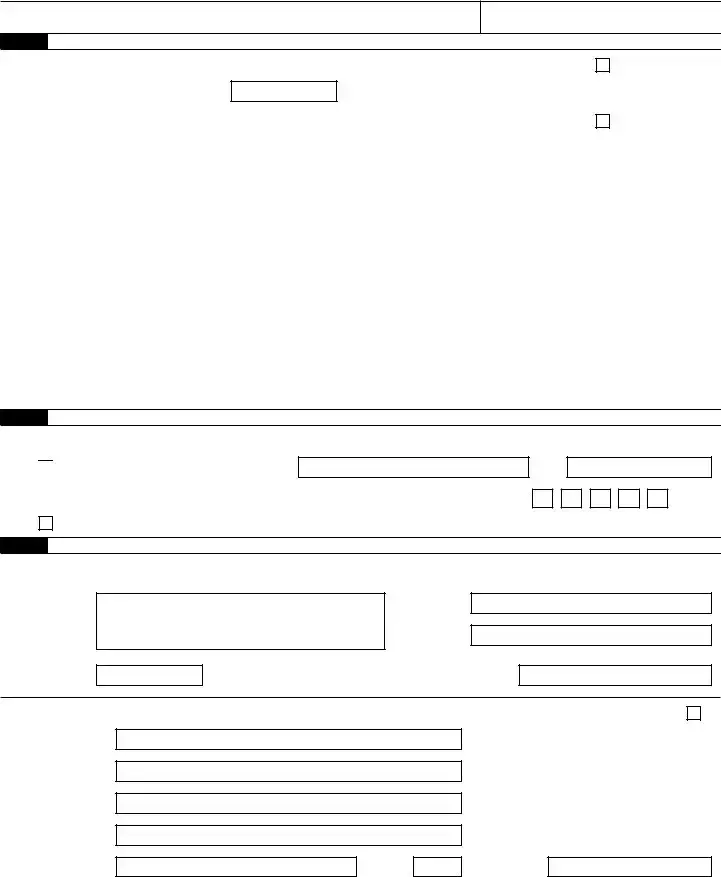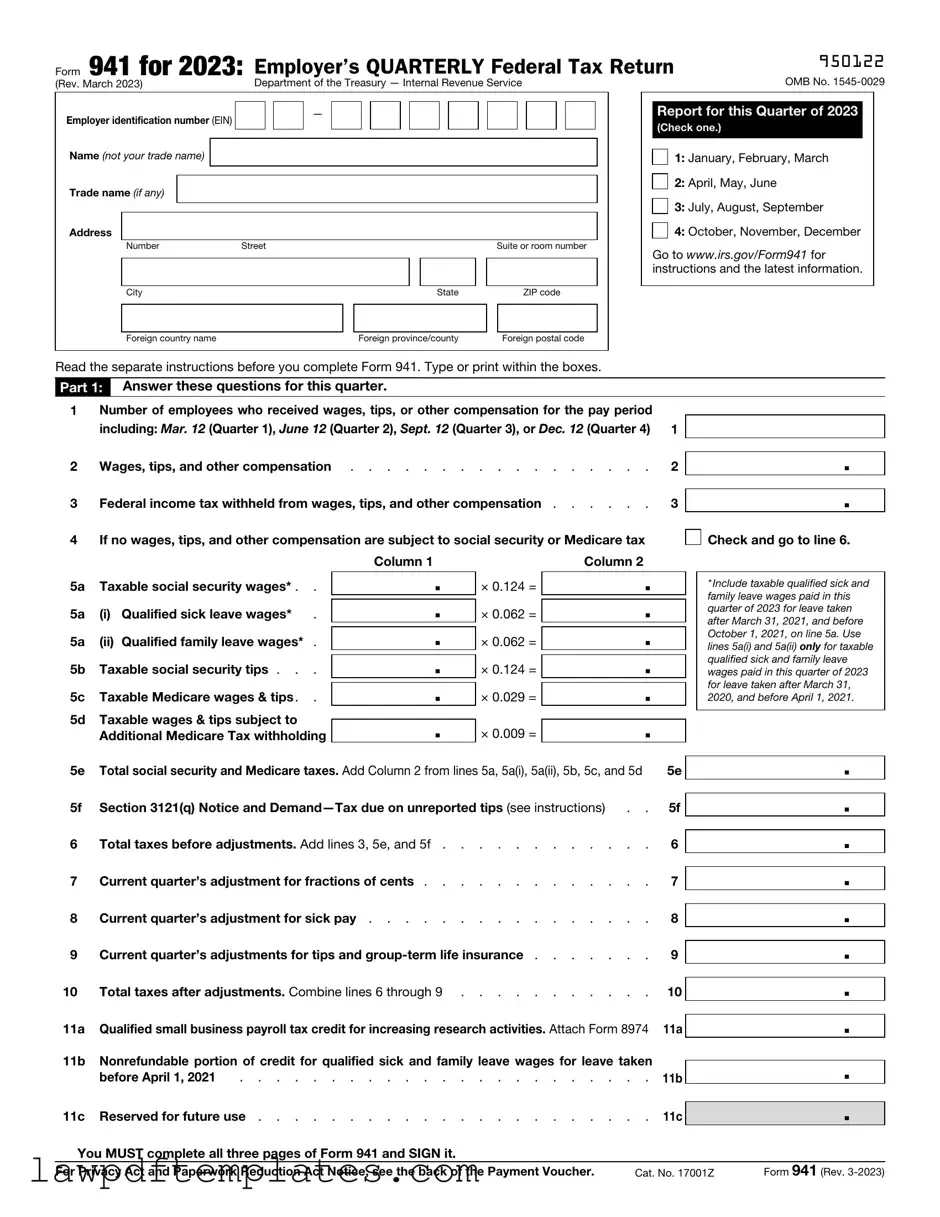Fillable IRS 941 Template
File Details
| Fact Name | Description |
|---|---|
| Purpose | The IRS Form 941 is used by employers to report income taxes, Social Security tax, and Medicare tax withheld from employee wages. |
| Filing Frequency | Employers must file Form 941 quarterly, meaning it is due four times a year. |
| Due Dates | The due dates for filing Form 941 are typically the last day of the month following the end of each quarter. |
| Quarterly Schedule | For example, the first quarter covers January to March, and the form is due by April 30. |
| Who Must File | Any employer who pays wages subject to federal income tax withholding must file this form. |
| Penalties | Failure to file Form 941 on time may result in penalties and interest on unpaid taxes. |
| State-Specific Forms | Some states have their own forms for reporting payroll taxes, governed by state laws such as the California Employment Development Department (EDD) regulations. |
| Electronic Filing | Employers can file Form 941 electronically, which can expedite processing and reduce errors. |
| Recordkeeping | Employers should keep copies of Form 941 and related records for at least four years. |
| Amended Returns | If mistakes are made, employers can file Form 941-X to correct any errors on previously submitted forms. |
Sample - IRS 941 Form

Form 941 for 2023: |
Employer’s QUARTERLY Federal Tax Return |
950122 |
|
|
|
(Rev. March 2023) |
Department of the Treasury — Internal Revenue Service |
OMB No. |
Employer identification number (EIN) |
|
|
|
— |
|
|
|
|
|
|
|
|
|
|
|
|
|
|||
|
|
|
|
|
|
|
|
|
|
|
|
|
|
|
|
|
||||
|
|
|
|
|
|
|
|
|
|
|
|
|
|
|
|
|
|
|
|
|
|
|
|
|
|
|
|
|
|
|
|
|
|
|
|
|
|
|
|
|
|
Name (not your trade name) |
|
|
|
|
|
|
|
|
|
|
|
|
|
|
|
|
|
|
||
|
|
|
|
|
|
|
|
|
|
|
|
|
|
|
|
|
|
|
|
|
|
|
|
|
|
|
|
|
|
|
|
|
|
|
|
|
|
|
|
|
|
Trade name (if any) |
|
|
|
|
|
|
|
|
|
|
|
|
|
|
|
|
|
|
||
Address |
|
|
|
|
|
|
|
|
|
|
|
|
|
|
|
|
|
|
|
|
|
|
|
|
|
|
|
|
|
|
|
|
|
|
|
|
|
|
|||
|
|
|
|
|
|
|
|
|
|
|
|
|
|
|
|
|
|
|||
Number |
Street |
|
|
|
|
|
Suite or room number |
|
|
|
|
|
|
|
|
|
|
|
|
|
|
|
|
|
|
|
City |
|
|
|
|
State |
|
|
ZIP code |
|
|
|
|
|
|
|
||
|
|
|
|
|
|
|
||
Foreign country name |
|
|
Foreign province/county |
|
|
Foreign postal code |
||
Report for this Quarter of 2023
(Check one.)
1: January, February, March
2: April, May, June
3: July, August, September
4: October, November, December
Go to www.irs.gov/Form941 for instructions and the latest information.
Read the separate instructions before you complete Form 941. Type or print within the boxes.
Part 1: Answer these questions for this quarter.
1 |
Number of employees who received wages, tips, or other compensation for the pay period |
|
including: Mar. 12 (Quarter 1), June 12 (Quarter 2), Sept. 12 (Quarter 3), or Dec. 12 (Quarter 4) 1 |
2 |
Wages, tips, and other compensation |
. |
2 |
|||||
3 |
Federal income tax withheld from wages, tips, and other compensation |
. |
3 |
|||||
4 |
If no wages, tips, and other compensation are subject to social security or Medicare tax |
|
||||||
|
|
Column 1 |
|
Column 2. |
|
|||
5a |
Taxable social security wages* . . |
. |
× 0.124 = |
|
||||
|
|
|
|
|
|
. |
|
|
5a |
(i) |
Qualified sick leave wages* . |
. |
× 0.062 = |
|
|
||
|
|
|
|
|
|
. |
|
|
5a |
(ii) |
Qualified family leave wages* . |
. |
× 0.062 = |
|
|
||
|
|
|
|
|
. |
|
||
5b |
Taxable social security tips . . . |
. |
× 0.124 = |
|
|
|||
|
|
|
|
|
. |
|
||
5c |
Taxable Medicare wages & tips. . |
. |
× 0.029 = |
|
|
|||
5d |
Taxable wages & tips subject to |
|
|
|
|
|
||
. |
× 0.009 = |
|
. |
|
||||
|
Additional Medicare Tax withholding |
|
|
|||||
5e |
Total social security and Medicare taxes. Add Column 2 from lines 5a, 5a(i), 5a(ii), 5b, 5c, and 5d |
|
5e |
|||||
5f |
Section 3121(q) Notice and |
. |
5f |
|||||
6 |
Total taxes before adjustments. Add lines 3, 5e, and 5f |
. |
6 |
|||||
7 |
Current quarter’s adjustment for fractions of cents |
. |
7 |
|||||
8 |
Current quarter’s adjustment for sick pay |
. |
8 |
|||||
9 |
Current quarter’s adjustments for tips and |
. |
9 |
|||||
10 |
Total taxes after adjustments. Combine lines 6 through 9 |
. |
10 |
|||||
11a |
Qualified small business payroll tax credit for increasing research activities. Attach Form 8974 |
11a |
||||||
11b |
Nonrefundable portion of credit for qualified sick and family leave wages for leave taken |
|
||||||
|
before April 1, 2021 |
. . . . . . . . . . . . . . . . . . . . . . |
. |
11b |
||||
.
.

 Check and go to line 6.
Check and go to line 6.
*Include taxable qualified sick and family leave wages paid in this quarter of 2023 for leave taken after March 31, 2021, and before October 1, 2021, on line 5a. Use lines 5a(i) and 5a(ii) only for taxable qualified sick and family leave wages paid in this quarter of 2023 for leave taken after March 31, 2020, and before April 1, 2021.
.
.
.
.
.
.
.
.
.
11c Reserved for future use . . . . . . . . . . . . . . . . . . . . . . 11c 
.
You MUST complete all three pages of Form 941 and SIGN it.
For Privacy Act and Paperwork Reduction Act Notice, see the back of the Payment Voucher. |
Cat. No. 17001Z |
Form 941 (Rev. |

951222
Name (not your trade name) |
Employer identification number (EIN) |
|
|
|
– |
Part 1: |
Answer these questions for this quarter. (continued) |
|
11d Nonrefundable portion of credit for qualified sick and family leave wages for leave taken after March 31, 2021, and before October 1, 2021 . . . . . . . . . . . . . 11d
.
|
|
|
|
|
11e |
Reserved for future use |
. . . . . . . . . 11e |
. |
|
11f |
Reserved for future use |
|
|
|
|
|
|
||
11g |
Total nonrefundable credits. Add lines 11a, 11b, and 11d |
11g |
12 |
Total taxes after adjustments and nonrefundable credits. Subtract line 11g from line 10 . |
12 |
.
.
13a |
Total deposits for this quarter, including overpayment applied from a prior quarter and |
|
|
overpayments applied from Form |
13a |
13b |
Reserved for future use |
13b |
.
 .
.
13c Refundable portion of credit for qualified sick and family leave wages for leave taken |
|
before April 1, 2021 |
13c |
13d Reserved for future use |
13d |
.
 .
.
13e Refundable portion of credit for qualified sick and family leave wages for leave taken after March 31, 2021, and before October 1, 2021 . . . . . . . . . . . . . . 13e
.
13f |
Reserved for future use |
13f |
13g |
Total deposits and refundable credits. Add lines 13a, 13c, and 13e |
13g |
13h |
Reserved for future use |
13h |
13i |
Reserved for future use |
13i |
14Balance due. If line 12 is more than line 13g, enter the difference and see instructions . . . 14
|
|
|
|
15 |
Overpayment. If line 13g is more than line 12, enter the difference |
. |
Check one: |
 .
.
.
 .
.
 .
.
.
Apply to next return. |
|
Send a refund. |
Part 2: Tell us about your deposit schedule and tax liability for this quarter.
If you’re unsure about whether you’re a monthly schedule depositor or a semiweekly schedule depositor, see section 11 of Pub. 15.
16 Check one:
Line 12 on this return is less than $2,500 or line 12 on the return for the prior quarter was less than $2,500, and you didn’t incur a $100,000
You were a monthly schedule depositor for the entire quarter. Enter your tax liability for each month and total
liability for the quarter, then go to Part 3.
|
|
|
Tax liability: Month 1 |
. |
|
|
|
|
Month 2 |
. |
|
|
|
|
Month 3 |
. |
|
|
|
|
Total liability for quarter |
. |
Total must equal line 12. |
You were a semiweekly schedule depositor for any part of this quarter. Complete Schedule B (Form 941),
Report of Tax Liability for Semiweekly Schedule Depositors, and attach it to Form 941. Go to Part 3.
You MUST complete all three pages of Form 941 and SIGN it.
Page 2 |
Form 941 (Rev. |

950922
Name (not your trade name)
Employer identification number (EIN)
–
Part 3: Tell us about your business. If a question does NOT apply to your business, leave it blank.
17 If your business has closed or you stopped paying wages . . . . . . . . . . . . . . .
Check here, and
enter the final date you paid wages
/ /
; also attach a statement to your return. See instructions.
18 If you’re a seasonal employer and you don’t have to file a return for every quarter of the year . . .
Check here.
19Qualified health plan expenses allocable to qualified sick leave wages for leave taken before April 1, 2021
20Qualified health plan expenses allocable to qualified family leave wages for leave taken before April 1, 2021
21 |
Reserved for future use |
22 |
Reserved for future use |
23Qualified sick leave wages for leave taken after March 31, 2021, and before October 1, 2021
24Qualified health plan expenses allocable to qualified sick leave wages reported on line 23
25Amounts under certain collectively bargained agreements allocable to qualified sick
leave wages reported on line 23 . . . . . . . . . . . . . . . . . . .
26Qualified family leave wages for leave taken after March 31, 2021, and before October 1, 2021
27Qualified health plan expenses allocable to qualified family leave wages reported on line 26
28Amounts under certain collectively bargained agreements allocable to qualified family leave wages reported on line 26 . . . . . . . . . . . . . . . . . . .
|
|
19 |
. |
|
|
20 |
. |
|
|
21 |
. |
|
|
22 |
. |
|
|
23 |
. |
|
|
24 |
. |
|
|
25 |
. |
|
|
26 |
. |
|
|
27 |
. |
|
|
28 |
. |
Part 4: May we speak with your
Do you want to allow an employee, a paid tax preparer, or another person to discuss this return with the IRS? See the instructions
for details.

 Yes. Designee’s name and phone number
Yes. Designee’s name and phone number
Select a
No.
Part 5: Sign here. You MUST complete all three pages of Form 941 and SIGN it.
Under penalties of perjury, I declare that I have examined this return, including accompanying schedules and statements, and to the best of my knowledge and belief, it is true, correct, and complete. Declaration of preparer (other than taxpayer) is based on all information of which preparer has any knowledge.
Sign your name here
Date
/ /
Print your name here
Print your title here
Best daytime phone
Paid Preparer Use Only
Preparer’s name
Preparer’s signature
Firm’s name (or yours if
Address
City
State
Check if you’re
PTIN |
|
|
|
|
|
|
|
Date |
/ |
/ |
|
EIN |
|
|
|
|
|
|
|
Phone |
|
|
|
|
|
|
ZIP code
Page 3 |
Form 941 (Rev. |
951020
This page intentionally left blank

Form
Purpose of Form
Complete Form
Making Payments With Form 941
To avoid a penalty, make your payment with Form 941 only if:
•Your total taxes after adjustments and nonrefundable credits (Form 941, line 12) for either the current quarter or the preceding quarter are less than $2,500, you didn’t incur a $100,000
•You’re a monthly schedule depositor making a payment in accordance with the Accuracy of Deposits Rule. See section 11 of Pub. 15 for details. In this case, the amount of your payment may be $2,500 or more.
Otherwise, you must make deposits by electronic funds transfer. See section 11 of Pub. 15 for deposit instructions. Don’t use Form
▲! Use Form
CAUTION Form 941 that should’ve been deposited, you may be subject to a penalty. See Deposit Penalties in section 11 of Pub. 15.
Specific Instructions
Box
Box
Box
Box
•Enclose your check or money order made payable to “United States Treasury.” Be sure to enter your
EIN, “Form 941,” and the tax period (“1st Quarter 2023,” “2nd Quarter 2023,” “3rd Quarter 2023,” or “4th Quarter 2023”) on your check or money order. Don’t send cash.
Don’t staple Form
•Detach Form
and Form 941 to the address in the Instructions for Form 941.
Note: You must also complete the entity information above Part 1 on Form 941.
Detach Here and Mail With Your Payment and Form 941.
Form |
|
|
|
|
Payment Voucher |
|
OMB No. |
||||
|
|
|
|
||||||||
|
|
|
|
|
|
|
|
|
|
||
|
Department of the Treasury |
|
|
Don’t staple this voucher or your payment to Form 941. |
|
2023 |
|||||
|
Internal Revenue Service |
|
|
|
|||||||
|
1 Enter your employer identification |
|
2 |
|
Dollars |
|
|
Cents |
|||
|
|
number (EIN). |
|
|
Enter the amount of your payment. |
|
|
|
|
||
|
|
|
|
|
|
|
|
|
|
||
|
|
– |
|
|
Make your check or money order payable to “United States Treasury.” |
|
|
|
|||
3 |
Tax Period |
|
4 Enter your business name (individual name if sole proprietor). |
|
|
||||||
|
|
|
|
|
|
|
|
|
|
|
|
|
|
1st |
|
3rd |
|
|
|
|
|
|
|
|
|
|
|
|
|
|
|
|
|||
|
|
Quarter |
|
Quarter |
|
Enter your address. |
|
|
|||
|
|
|
|
|
|
|
|||||
|
|
2nd |
|
4th |
|
|
|||||
|
|
|
|
Enter your city, state, and ZIP code; or your city, foreign country name, foreign province/county, and foreign postal code. |
|||||||
|
|
Quarter |
|
Quarter |
|
|
|
|
|
|
|
|
|
|
|
|
|
|
|
|
|
|
|

Form 941 (Rev.
Privacy Act and Paperwork Reduction Act Notice. We ask for the information on Form 941 to carry out the Internal Revenue laws of the United States. We need it to figure and collect the right amount of tax. Subtitle C, Employment Taxes, of the Internal Revenue Code imposes employment taxes on wages and provides for income tax withholding. Form 941 is used to determine the amount of taxes that you owe. Section 6011 requires you to provide the requested information if the tax is applicable to you. Section 6109 requires you to provide your identification number. If you fail to provide this information in a timely manner, or provide false or fraudulent information, you may be subject to penalties.
You’re not required to provide the information requested on a form that is subject to the Paperwork Reduction Act unless the form displays a valid OMB control number. Books and records relating to a form or its instructions must be retained as long as their contents may become material in the administration of any Internal Revenue law.
Generally, tax returns and return information are confidential, as required by section 6103. However, section 6103 allows or requires the IRS to disclose or give the information shown on your tax return to others as described in the Code. For example, we may disclose your tax information to the Department of
Justice for civil and criminal litigation, and to cities, states, the District of Columbia, and U.S. commonwealths and possessions for use in administering their tax laws. We may also disclose this information to other countries under a tax treaty, to federal and state agencies to enforce federal nontax criminal laws, or to federal law enforcement and intelligence agencies to combat terrorism.
The time needed to complete and file Form 941 will vary depending on individual circumstances. The estimated average time is:
Recordkeeping . . . . . . . . . . 22 hr., 28 min.
Learning about the law or the form . . |
. . 53 min. |
Preparing, copying, assembling, and |
|
sending the form to the IRS |
1 hr., 18 min. |
If you have comments concerning the accuracy of these time estimates or suggestions for making Form 941 simpler, we would be happy to hear from you. You can send us comments from www.irs.gov/FormComments. Or you can send your comments to Internal Revenue Service, Tax Forms and Publications Division, 1111 Constitution Ave. NW,
Common mistakes
Filling out the IRS Form 941 can be a complex process, and mistakes can lead to delays or penalties. One common error is failing to report all wages paid to employees. Employers must include all taxable wages, tips, and other compensation. Omitting any amount can result in an inaccurate tax liability.
Another frequent mistake is incorrect calculation of the tax liability. Employers must accurately calculate the amount of Social Security and Medicare taxes owed based on the wages reported. Miscalculations can occur due to rounding errors or misapplying tax rates.
Many people also overlook the importance of timely filing. Form 941 must be filed quarterly, and missing the deadline can lead to penalties. Employers should mark their calendars to ensure they submit the form on time, avoiding unnecessary fees.
In addition, some filers fail to sign the form. The IRS requires a signature to validate the submission. Without a signature, the form may be considered incomplete, which can lead to processing delays.
Another common mistake is using outdated forms. The IRS occasionally updates its forms and instructions. Using an old version can result in incorrect information being reported, which may lead to complications.
Employers sometimes misclassify employees as independent contractors. This misclassification can affect the amounts reported on Form 941. It is essential to understand the differences between employee and contractor status to ensure accurate reporting.
Providing incorrect or missing information about the business can also create issues. Filers must ensure that the name, address, and Employer Identification Number (EIN) are accurate. Errors in this information can lead to confusion and delays in processing.
Finally, many people do not keep adequate records. Supporting documentation is crucial in case of an audit or inquiry. Employers should maintain detailed records of wages paid, taxes withheld, and any other relevant information to support their Form 941 submissions.
Common PDF Documents
If Medicare Denies a Claim Do I Have to Pay - Beneficiaries can utilize this notice to better understand their rights and options.
This form is a crucial document for parents needing a reliable solution. The "temporary Power of Attorney for a Child" enables guardians to ensure that their child's welfare is in trusted hands during their absence. For more information, please refer to the Power of Attorney for a Child form.
Traitor Joes - Caring nature towards customer needs and preferences.
High School Transcript - Helps students track their academic progress over the years.
